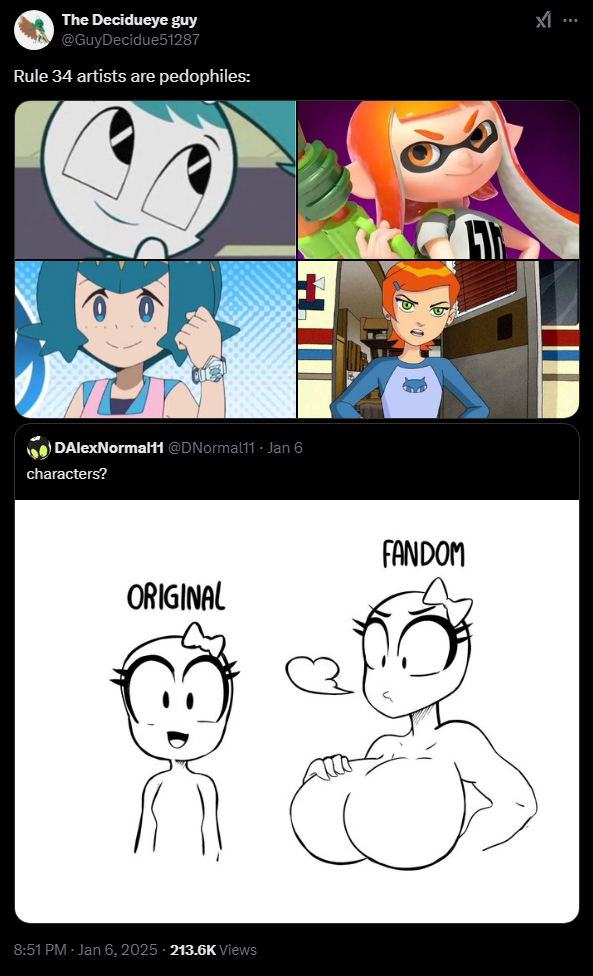PaperDerci on Nostr: Someone sent me this, and after the initial laugher, clowning on it, and talking ...
Someone sent me this, and after the initial laugher, clowning on it, and talking about how people don't seem to understand the purpose of the Splatoon player characters, I got to thinking:
What are people basing their morality on? What is the logic behind most people's morals?
Because the logic behind mines is: If you are doing or have done something to harm or severely inconvenience another person, or the effect of your actions have done that, it is or was wrong.
It's a pretty... human and consequence based though process.
But, given that line of logic, I... Can't see something like lolicon, or videogame child murder as explicitly morally wrong because there is no real people who are actually being harmed.
In fact, all discussions of morality I apply to fiction are entirely hypothetical.
Like RDR1 - I think Edgar Ross is morally despicable, and the only difference between him and, say... Dutch is that he fights for the law, Dutch fights against the law. But I don't really care as much as I would if they were real events.
If the piece of media wants me to care about the morality, I do. If it doesn't, then I don't.
Child soldiers are horrible, it's a terrible and abusive idea.
Splatoon does not care. So neither do I.
But, then, when discussing Lolicon, people will go, "Yeah it's not real but the fact someone can enjoy it anyway says a lot about their morals."
And that just has me thinking...
What is their morality based on? What is their mindset? What is the logic?
Is their morality logical in the first place? Am I the weirdo for putting an emphasis on the logic of my morality?

What are people basing their morality on? What is the logic behind most people's morals?
Because the logic behind mines is: If you are doing or have done something to harm or severely inconvenience another person, or the effect of your actions have done that, it is or was wrong.
It's a pretty... human and consequence based though process.
But, given that line of logic, I... Can't see something like lolicon, or videogame child murder as explicitly morally wrong because there is no real people who are actually being harmed.
In fact, all discussions of morality I apply to fiction are entirely hypothetical.
Like RDR1 - I think Edgar Ross is morally despicable, and the only difference between him and, say... Dutch is that he fights for the law, Dutch fights against the law. But I don't really care as much as I would if they were real events.
If the piece of media wants me to care about the morality, I do. If it doesn't, then I don't.
Child soldiers are horrible, it's a terrible and abusive idea.
Splatoon does not care. So neither do I.
But, then, when discussing Lolicon, people will go, "Yeah it's not real but the fact someone can enjoy it anyway says a lot about their morals."
And that just has me thinking...
What is their morality based on? What is their mindset? What is the logic?
Is their morality logical in the first place? Am I the weirdo for putting an emphasis on the logic of my morality?

